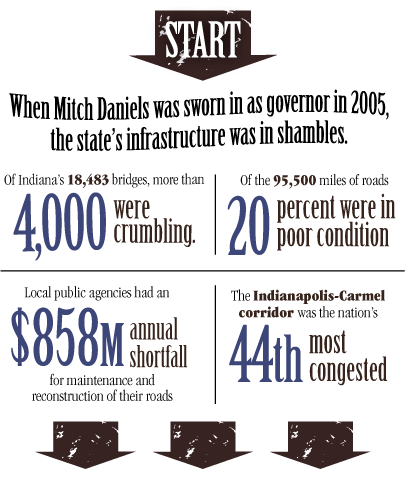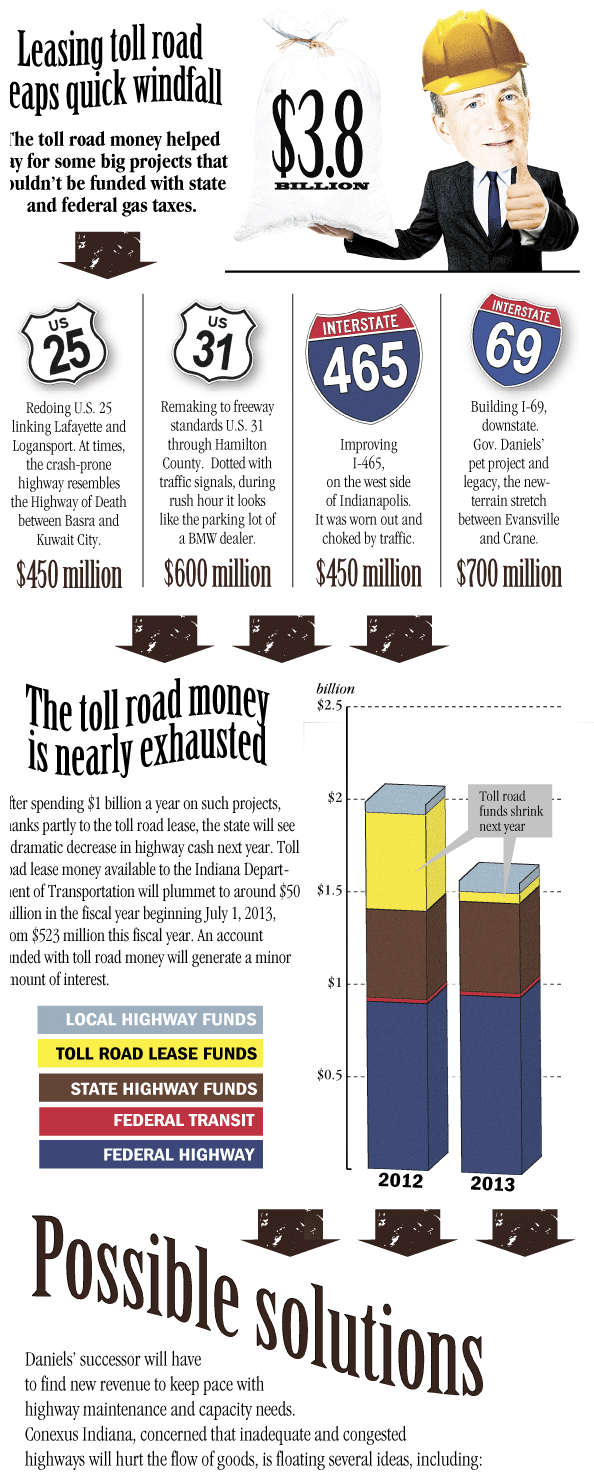Subscriber Benefit
As a subscriber you can listen to articles at work, in the car, or while you work out. Subscribe NowThree billion, 800 million dollars. The Spanish-Australian consortium Cintra-Macquarie wired the fortune to Indiana bank accounts six years ago this month after leasing the Indiana Toll Road in northern Indiana for 75 years.
With one fell swoop, Gov. Mitch Daniels’ status as a privatization guru soared, and some legislators and others congratulated themselves that highway funding had been solved, at least for a while. Democrats, meanwhile, groused that Daniels kissed toll road revenue goodbye for almost a century.
Then the recession drove down construction costs, allowing the state to get more bang for its toll road dollars. Among 100 road and bridge projects undertaken with the toll road money was the long-talked-about Interstate 69 extension between Evansville and Indianapolis.
Now, nearly all the money is spent or committed, and Conexus Indiana says roads and bridges are crumbling again. How does the group, which focuses on manufacturing and logistics, recommend paying for the improvements? In effect, by raising taxes.


Tie federal fuel taxes to inflation.
This is easier said than done and would require an act of Congress. Indiana’s federal highway funds come in part from the state’s share of 18.4 cents in federal gasoline fuel taxes.
End diversions of federal highway account collections.
Highway agencies like INDOT aren’t the only ones getting a share of state fuel taxes. So do the Bureau of Motor Vehicles and Indiana State Police—$146 million a year when counting all the agencies tapping the fund. Find some other way to fund non-highway agencies, Conexus suggests.
Tie the state’s fuel tax to the previous year’s inflation rate.
The 18-cents-a-gallon gasoline/ 27-cents-a-gallon diesel rate raised $839 million in fiscal year 2011. But the rates were set in 2003, so they don’t reflect inflation. “Exploding commodity costs continue to decimate the purchasing power of public sector construction budgets. Asphalt, concrete, steel and diesel fuel have also seen double-digit cost increases in recent years,” Conexus said. Under the Conexus proposal, if inflation rose 3 percent in one year, the per-gallon gasoline tax would rise about a half cent, to 18.55 cents a gallon.
More fuel-efficient vehicles hurt fuel tax revenue, but especially so do hybrids. Implement fees on the state and federal level commensurate with traditional fuel vehiclesin the same class.
Institute a mileage tax
As technology evolves, it might be practical to assess such a tax if a gas pump were able to talk to a vehicle to find out how far it’s driven since the last fill-up.

Indexing state fuel taxes to the rate of inflation won’t appeal to the masses, said former state Rep. Mike Murphy, a Republican. While proponents might not call it a tax increase, it effectively amounts to that, he said.
 Murphy
Murphy“What part of ‘no new taxes’ do these people not understand?” Murphy said, noting the “halting” state of the economy and growing concerns about taxes and government growth. “It’s absolutely one of the craziest ideas I’ve heard.”
Of course, crazy is relative.
Trucking firms, say, might prefer paying more fuel taxes than tolling more roads, said Gary Langston, president of the Indiana Motor Truck Association.
“There’s no question we need to find ways to maintain our infrastructure,” Langsford added.
On the other hand, the “big hole” from Major Moves money is not quite as big or critical as some think, said Michael Hicks, an economist at Ball State University.
He said much of the money was distributed to communities near the toll road that have yet to do much with it. “One great benefit of Major Moves was in jump-starting some key new construction, which will most likely continue under long-term contracts.”
That doesn’t mean there aren’t problems with highway funding, especially that from the federal government. And cars are indeed becoming more efficient, which means less revenue per mile. Growing cities–including Indianapolis–also are dealing with real congestion problems, he noted.
 Hicks
HicksBut that doesn’t mean roads are necessarily the answer, Hicks said, noting the potential for more public transportation.
“While more gasoline taxes are needed if we want our highways to modernize, I think a more critical problem is in addressing congestion more holistically than through a single tax instrument.”
For instance, the Indy Connect initiative to bring bus rapid transit service to the region and commuter rail between downtown and Noblesville proposes raising taxes in Marion and Hamilton counties only, to fund them.
That assumes the Indiana General Assembly can be convinced to OK a referendum and voters in turn vote for higher taxes to fund the system.
Voters living in urban and suburban areas have developed an appetite for investments in public transportation, Hicks added.
“We ought to give them the tools to do so locally, while acknowledging the statewide issues at play” such as congestion, economic development and quality of life.•
Please enable JavaScript to view this content.
